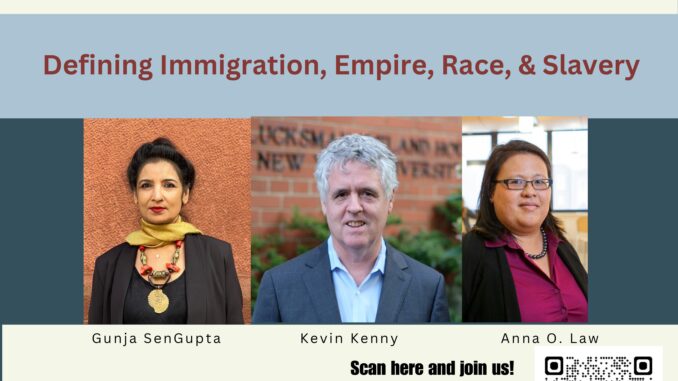
By Kaylin Guzman
The discussion “Defining Immigration, Empire, Race, and Slavery” was hosted by The Wolfe Institute on Feb. 27, focusing on research done by experts and immigration’s effect on modern governments.
The event occurred at a time when immigration to the U.S. is a focus for many in New York City. People from all over the world come searching for the “American Dream” and wish to start their new lives in New York City. However, the experts’ presentations focused on the past of immigration and its impact on its present and future implications.
Anna O. Law guided the conversation between the authors and the audience. Law is an associate professor of political science and Herbert Kurz Chair in Constitutional Rights at BC. The first guest, Kevin Kenny, professor of history and Glucksman Professor in Irish Studies at New York University, spoke about his latest book, “The Problem of Immigration in the Slaveholding Republic.” Kenny teaches the history of U.S. immigration and global migration.
The second guest, Gunja SenGupta, is a history professor at BC and teaches at the Graduate Center. Her research focuses on 19th-century U.S. history within the global context of slavery and colonialism. She spoke about her book, “Sojourners, Sultans, and Slaves,” released in 2023.
“I am so glad that there is a synergy between these two books,” Law said. “There is a lot of overlap between what they talk about, but they address the same research question in very different ways that we’ll see.”
To begin the discussion, the floor was opened up to Dr. Kenny and his work. Kenny explained how his past research has impacted his latest work.
“A very different kind of history for me. A new kind of history because I spent my career writing what we call history from below, history from the bottom up […] In my previous work I never stopped to consider the question ‘who claimed authority over immigration and on what ground?’” said Kenny.
Kenny recalled the history of immigration and migration in the U.S. Topics spanned from the Native American people who were removed from their homes, to Chinese immigrants who were banned from entering the country. He asked the audience to reflect on laws in place in the U.S.
“In the history of the United States, you can look for answers to questions like that in the Constitution,” said Kenny. “The U.S. is very distinctive in having a written constitution that sets down rules and guidelines for who can do what. The really striking […] thing is that if you go to the Constitution it is silent on immigration.”
As Kenny went over the main effects of immigration on groups of people, SenGupta focused on specific stories she was able to uncover from the past.
“Now, migration stories lie at the heart of my book. These stories are set in the 19th century […] many of you know there was the spread of capitalism,” said SenGupta. “Entire information technologies of print, transport, and communication were weaving North America with the rest of the world.”
“In this book what we do is track the movement of people, of commodities, of ideas, of goods among nodes of commercial exchange, imperial power rivalries, and human activists,” said SenGupta.
Much of the information SenGupta shared were very specific stories of women in her book. One impactful woman was Mary Ann Shadd Cary. According to The National Women’s Hall of Fame, she was the first Black woman to edit a weekly paper and journalist. She was also a teacher that established schools all over North America for Black students.
“She advocated immigration to Canada which she represented as a colorblind, anti-slavery empire with a woman at its helm,” SenGupta said. “She was refashioning familiar American narratives about the supposedly liberating potential of westward expansion by relocating the promise of liberation.”
The Wolfe Institute will be continuing to host talks related to immigration as part of their “Philosophy of Immigration Series.” Their next scheduled discussion, “When We Decide: Plural Agency, Voluntariness, and Migrant Choice,” will be held on March 13.
